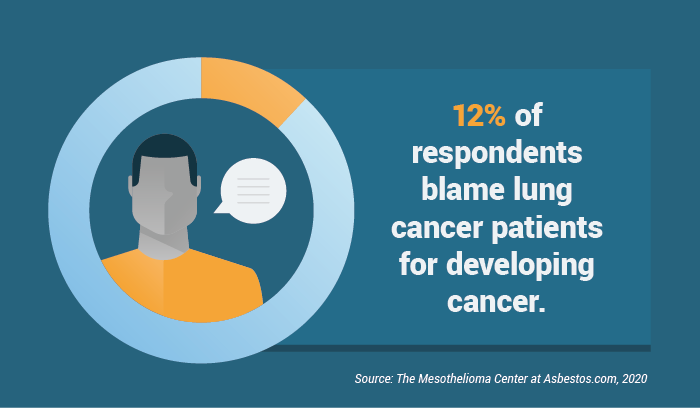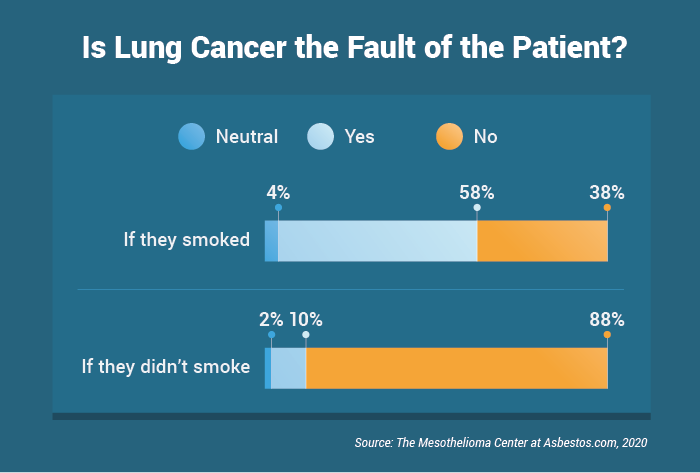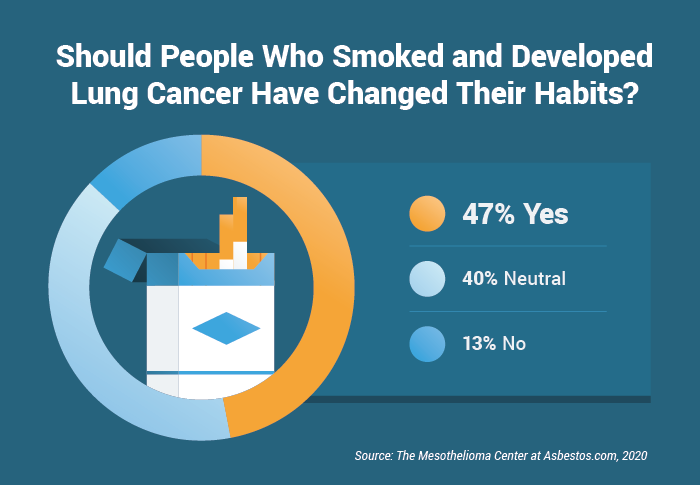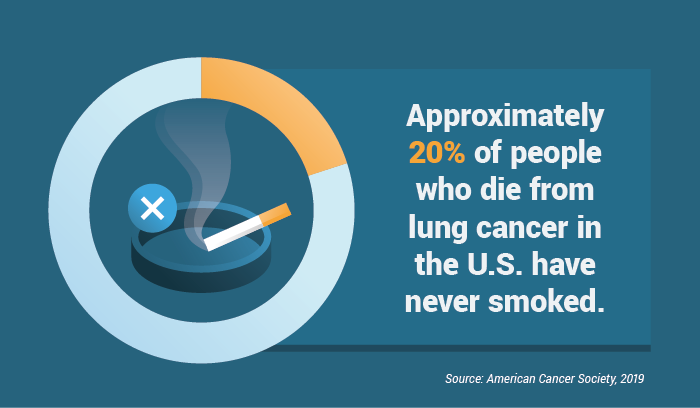Survey: 12% of Americans Blame Lung Cancer Patients for Diagnosis
Written by Karen Selby, RN • Edited By Walter Pacheco
Asbestos.com is the nation’s most trusted mesothelioma resource
The Mesothelioma Center at Asbestos.com has provided patients and their loved ones the most updated and reliable information on mesothelioma and asbestos exposure since 2006.
Our team of Patient Advocates includes a medical doctor, a registered nurse, health services administrators, veterans, VA-accredited Claims Agents, an oncology patient navigator and hospice care expert. Their combined expertise means we help any mesothelioma patient or loved one through every step of their cancer journey.
More than 30 contributors, including mesothelioma doctors, survivors, health care professionals and other experts, have peer-reviewed our website and written unique research-driven articles to ensure you get the highest-quality medical and health information.
About The Mesothelioma Center at Asbestos.com
- Assisting mesothelioma patients and their loved ones since 2006.
- Helps more than 50% of mesothelioma patients diagnosed annually in the U.S.
- A+ rating from the Better Business Bureau.
- 5-star reviewed mesothelioma and support organization.
Testimonials
My family has only the highest compliment for the assistance and support that we received from The Mesothelioma Center. This is a staff of compassionate and knowledgeable individuals who respect what your family is experiencing and who go the extra mile to make an unfortunate diagnosis less stressful. Information and assistance were provided by The Mesothelioma Center at no cost to our family.LashawnMesothelioma patient’s daughter
How to Cite Asbestos.com’s Article
APA
Selby, K. (2024, February 29). Survey: 12% of Americans Blame Lung Cancer Patients for Diagnosis. Asbestos.com. Retrieved April 28, 2024, from https://www.asbestos.com/cancer/lung-cancer/diagnosis-blame/
MLA
Selby, Karen. "Survey: 12% of Americans Blame Lung Cancer Patients for Diagnosis." Asbestos.com, 29 Feb 2024, https://www.asbestos.com/cancer/lung-cancer/diagnosis-blame/.
Chicago
Selby, Karen. "Survey: 12% of Americans Blame Lung Cancer Patients for Diagnosis." Asbestos.com. Last modified February 29, 2024. https://www.asbestos.com/cancer/lung-cancer/diagnosis-blame/.
12% of Americans Blame Lung Cancer Patients for Their Disease
The Mesothelioma Center surveyed 1,000 Americans and found that 12% blame lung cancer patients for developing cancer.

Perceptions changed as we introduced qualifiers for the cause of the lung cancer cases. The amount of respondents who blamed patients for their lung cancer if they smoked increased to 58%, while the amount for nonsmokers remained relatively low.

The stigma associated with smoking and lung cancer causes people to develop assumptions about who or what to blame when it comes to a diagnosis.
A person may not know whether a lung cancer patient has a smoking history, so jumping to conclusions just perpetuates the stigma.
How Addiction Makes Quitting an Enormous Task
Nearly half of respondents believe those who smoked and developed lung cancer should have changed their habits in order to avoid illness.

The link between smoking and lung cancer has been scientifically established. We now know avoiding tobacco significantly lowers your risk of developing lung cancer.
But once a smoking habit is formed, it’s very difficult to break. While people may know that avoiding tobacco is a healthier lifestyle choice, quitting smoking is an enormous task to achieve.
In fact, research suggests nicotine can be as addictive as alcohol, cocaine and even heroin.
Anyone can become addicted to nicotine, but for those who struggle with depression or mental illness, illegal substance abuse and negative influences from family or peers have a much higher chance of addiction.
Nicotine dependency often begins at an early age, and the user isn’t thinking about long-term health consequences.
A study from the Surgeon General’s Report shows that two out of three high school smokers will continue smoking into adulthood, and one of the two will die of tobacco-related illness. Avoiding tobacco — especially at an early age — is an important choice you can make for optimal lung health.
Lung Cancer Risk Factors Encompass More Than Tobacco Use
While avoiding tobacco does help lower your risk of lung cancer, it doesn’t put you in the clear.
Most people directly associate lung cancer with smoking. However, there are other factors that contribute to lung cancer risk.
Many of these nonsmoking factors, such as genes and circumstantial exposure, are unavoidable. The lack of awareness around these other causes of lung cancer has led to a general stigmatization of lung cancer patients overall.

- Secondhand smoke causes more than 7,000 lung cancer deaths. Inhalation of secondhand smoke is often accidental or unavoidable, particularly in childhood if a parent or guardian smoked.
- Air pollution accounts for approximately 10,000 lung cancer deaths. It’s often difficult for people in polluted cities to move because they depend on their location for their job or familial support.
- Radon gas contributes to 21,000 lung cancer deaths. Radon can’t be seen or smelled, and it is sometimes present in concentrated amounts in older homes that haven’t been properly tested.
- Asbestos exposure is responsible for an estimated 6,000 lung cancer deaths. Asbestos is often present in homes and job sites without a person being aware of it.
Asbestos and Lung Cancer
Asbestos cancers, including asbestos-related lung cancer and mesothelioma, are caused by the inhalation of asbestos fibers, which damage lung cells.
A person can come into contact with asbestos in a number of ways. People who worked in shipyards, construction sites and factories may be at especially high risk for asbestos exposure. Military personnel are also at risk because of the high use of asbestos-contaminated materials by all branches of the U.S. military.
Lung cancer is a difficult disease, and stigmatizing those affected by it does nothing to help. As a society, we can better learn about the causes of lung cancer, ways to prevent it and the potential risk factors in an effort to stay ahead.
If you suspect that you or a loved one have been exposed to any risk factors, such as cigarette smoking, secondhand smoke, asbestos or any other known carcinogens, visit your primary care physician for a screening right away. The best defense against cancer is catching it early.
Methodology:
This study consisted of four survey questions conducted using Google Surveys. The sample consisted of no less than 1,000 completed responses per question. Post-stratification weighting has been applied to ensure an accurate and reliable representation of the total population. The surveys ran during December 2019 and January 2020.







